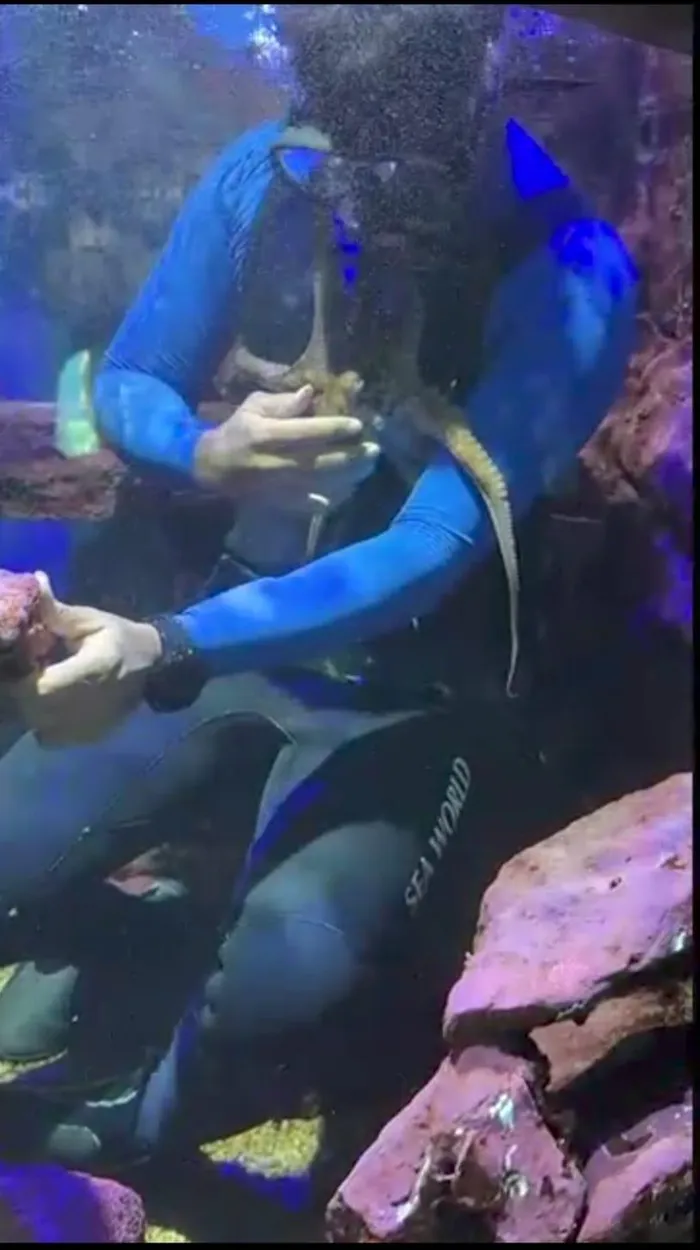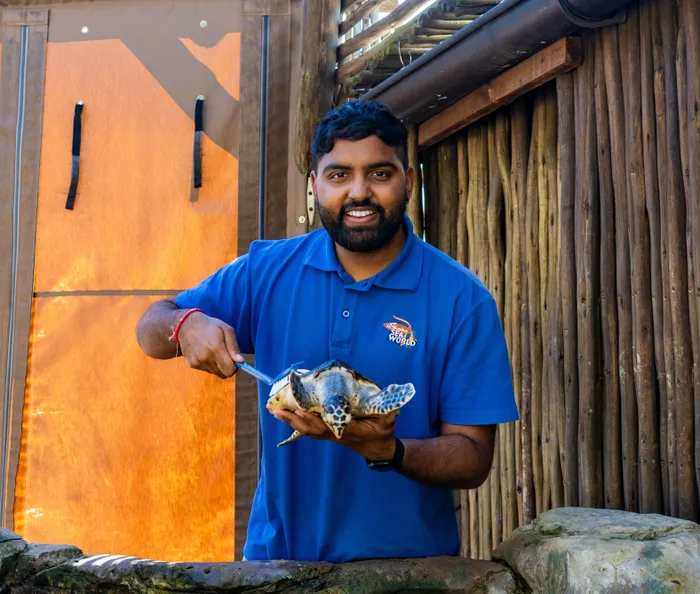
Lingesan Perumal with Gyūki
Image: Supplied
Driven by his belief that “to truly connect to God, one must connect with nature,” Lingesan Perumal is living his dream by bonding with creatures from under the sea.
Perumal, 24, of Centenary Park in Phoenix, is an aquarist for the South African Association for Marine Biological Research (SAAMBR) and works at Ushaka Marine World.
He has formed a special bond with an octopus he named Gyūki, who he has trained to respond to finger clicks, complete food puzzles, open feeder jars, and conquer maze tubes.
“I named him after a character from my favourite anime, who closely resembles an eight-tailed creature. When he first arrived, Gyūki was small, shy, and cautious. He hid whenever I entered the exhibit for cleaning. But I always gave him the choice to engage. Over time, he began to trust me. Now, whenever I enter the exhibit, he doesn’t hide but becomes curious and playful,” said Perumal.
He said octopuses like Gyūki (Octopus vulgaris) were highly intelligent and believed to be capable of recognising individual humans by sight, scent, and touch.
“To keep him mentally stimulated, I introduced enrichment activities like food puzzles, feeder jars, and maze tubes. I also trained him to respond to finger clicks in the water and when he hears the sound, he comes to interact with me. When he wants my attention, he playfully squirts water at me, while I am in the exhibit."
He said to gain Gyūki’s trust, he respected his boundaries.
“If he is not in the mood to interact, I give him space. That respect created a foundation of trust. His colour changes and body language also communicate his mood. For example, when he displays dark colours and actively explores, it usually means he is excited or curious. Our bond is one of mutual respect and understanding. He continues to teach me so much about the emotional intelligence of marine life."

Lingesan Perumal with one of the turtles in his care.
Image: Supplied
Perumal studied at the University of KwaZulu-Natal, and completed a three-year Bachelor of Science degree in marine biology.
“From a young age, my father, who was a Swami (a religious leader), believed that to truly connect with God, one must connect with nature. Growing up with those values, I developed a strong bond with the natural world and a deep love for animals.
“Becoming an aquarist felt like the perfect fit. It allows me to care for marine life, while growing as a scientist, educator and guardian of the ocean.
“I have had the privilege of working with a wide range of marine life, from formidable ragged-tooth sharks (Carcharias taurus) to microscopic brine shrimp. My best experience was caring for five round ribbontail rays that were born at uShaka Marine World when I first started as an aquarist in 2022."
He said each ribbontail ray had its own personality, which he found fascinating.
“One would sit on my feet during cleaning, patiently waiting for gentle back rubs, while another would come up to me during feeding time and patiently wait for food and would splash around if I wasn’t fast enough with its food.
"These rays were the first animals I felt were truly mine to care for and train. They taught me how intelligent and emotionally-expressive marine animals could be, and how meaningful it is to build mutual trust with them. This strong bond made it challenging when we released them into the wild, but I felt proud and honoured to be a part of their lives."
Perumal gets into the water of the open ocean exhibit at least twice a week for maintenance.
“As an aquarist, my role is both diverse and deeply rewarding. I am responsible for the daily care and maintenance of marine exhibits, which includes feeding, cleaning, and closely monitoring animal behaviour to ensure the animals are receiving the best care and husbandry for their overall well-being.
“I monitor water quality testing and manage complex filtration systems to maintain optimal aquatic environments. I assist with veterinary procedures, animal health checks, and the rehabilitation of sick, injured, or stranded marine animals. Enrichment and behavioural training are also key aspects of my work, helping to stimulate the animals mentally and physically."
He advised youngsters, who are curious and love the ocean, to pursue a career in the marine biology field
“My advice to young people who want to become an aquarist is to stay endlessly curious and always observe. The ocean is vast, mysterious, and constantly revealing new wonders and every animal has its own story to tell. Learn everything you can, not just about marine species, but about ecosystems, water chemistry, animal health, and conservation. Volunteering at an aquarium is one of the great ways to start your journey into marine life.
“Being an aquarist is not just about feeding or cleaning, it is about forming a connection between people and the underwater world. The job is incredibly fulfilling, and no two days are alike. One moment you are training a fish, the next you are responding to a sick animal or teaching a child about the ocean. If you are passionate, willing to learn, and ready to put in the work, you will find this career not only exciting, but deeply meaningful."
Ann Kunz, spokesperson for uShaka Marine World, said SAAMBR was proud to have Perumal on its team, and they were chuffed when the octopus took a special liking to him.
“The octopus recognises him as a gentle and kind presence, and has grown increasingly curious and playful, often enjoying a friendly head rub from Lingesan, who has become his trusted human companion.
“Octopuses are among the most intelligent invertebrates on the planet and can solve puzzles, open jars, navigate mazes, and even use tools. Their ability to learn through observation, adapt to new environments, and show distinct personalities has fascinated scientists and aquarists alike. This remarkable intelligence contributes to them forming curious, often playful, interactions when under human care,” said Kunz.